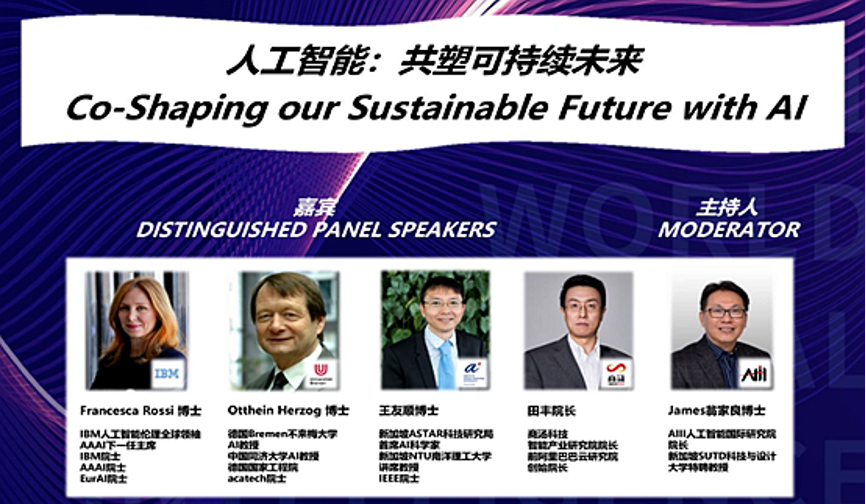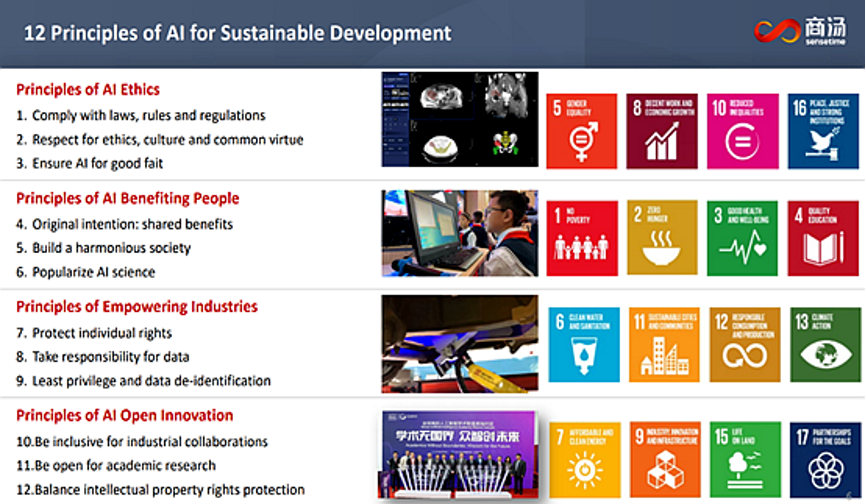- Highlights
On June 22, 2021, the WAIC 2021 International Webinar, which was held online, gathered an international expert panel to discuss and share their views on how to co-shape our sustainable future with AI.

The Webinar invited 4 distinguished panelists (3 Academicians and 1 Dean) from around the world, including Dr. Francesca Rossi, EurAI Academician, Dr. Otthein Herzog, Academician of acatech - Germany's National Academy of Science and Engineering, Dr. Ong Yew Soon, IEEE Academician, and Mr. Tian Feng, Dean of SenseTime's Intelligence Industry Research Institute, to discuss topics of AI and the human community, and explore ways to shape a sustainable future together.
Mr. Tian delivered a keynote speech on “AI for SDGs: Responsible AI Co-Shaping Better Future”, offering insights into many AI-related international topics, such as AI and necessary risk management practices and ethical use of regulatory policies, and how to accelerate uses of AI to solve climate change and other human survival crises.
The detailed contents of the Webinar dialogue are presented as follows:
Moderator Dr. James Ong: "Can you explain the original intention of “mutually beneficial”?"
Mr. Tian Feng: "Different countries and regions have different cultures and history, so there is no one shared global ethical standard. However, we have witnessed the good practices of the United Nations' SDGs (Sustainable Development Goals), which can help people around the world build shared values. Following the SDGs, we can utilize advanced science and technologies to offer better educational, medical and other social services. Therefore, despite the differences and discussions between the US, EU, and other countries, we still have shared values and common aspirations for the future."
Moderator Dr. James Ong: "We are aware of the importance of sharing, collaboration, shared culture, innovation cycles and other elements. What are the key aspects of “Work Together”?"
Mr. Tian Feng: "I think there are three keys: The first one is reaching a consensus over principles, such as the principles of benefiting humanity and empowering industries; The second key is establishing standards, such as ethical standards and technical standards; The third key is having the government play the exemplary and guiding role, unifying the collective force of all social entities to build the future."
The following are the detailed contents of the speech delivered by Mr. Tian Feng:
Mr. Tian Feng:
"It is my honor to be invited to this WAIC 2021 International Webinar. First of all, I would love to thank the moderator of this Webinar, Dr. James Ong, for providing us with this meaningful topic. Today, the topic I would like to discuss is “AI for SDGs: Responsible AI Co-Shaping Better Future”.
Why do we need AI to realize SDGs? From my point of view, there are three major challenges.
1. The first challenge is the shortage of man-power from 2021 to 2030. According to a research report by CNN, there are currently 34 countries have already entered the super-aging stage, with over 1.7 billion people over the age of 65.
2. The second challenge is the boom of smart devices and the lack of labor skills. Based on strategic analysis and data statistics, 50 billion smart IoT devices will be brought to fruition through 5G and AI innovations, while most emerging technologies should be used to offer education courses for the workforce and children, serving future needs.
3. The third challenge, and also the most critical challenge, is climate change. Studies conducted by the United Nations show that a 1.5 degrees Celsius rise in global temperature will accelerate the rising of sea levels, causing extreme weather conditions, and affecting 50% of the world's GDP.
Then, what is AI for SDGs? Sustainable Development Goals guide us in achieving a better and sustainable future for everyone. AI for SDGs encourages us “to develop AI technologies that advance the world’s economies, society, and humanity for a better tomorrow”. This is also the mission of SenseTime.
In February 2020, at the “Workshop on Science, Technology and Innovation for the SDGs” held at the United Nations Office in Vienna, I delivered the keynote speech under the topic of “Moral Standards for AI Sustainable Development”, which listed the four core values of human technology, shared benefits, integrated development and open innovation. By developing effective solutions, we can screen and detect individuals with fever in a crowd, offering strong support in the fight against the COVID pandemic. Leveraging AI technologies, we have demonstrated our core values and made contributions to public well-being and welfare.

In May 2020, SenseTime co-hosted the “AI for SDGs 2030” Webinar together with the United Nations Development Programme (UNDP), during which we released an upgraded report, Code of Ethics for AI Sustainable Development under the AI for SDG Framework. We proposed and implemented 12 principles under four categories:
1. The principle of AI ethics: A respectful, open dialogue and inclusive culture for SDGs 5, 8, 10 and 16.
2. The principle of AI benefiting people: shared benefits and harmonious society for SDGs 1, 2, 3 and 4.
3. The principle of AI empowering industries: accountability, self-regulation and security for SDGs 6, 11, 12 and 13.
4. The principle of AI Open Innovation: open innovation to make technologies more reliable for SDGs 7, 9, 15 and 17.
At the 2020 World Artificial Intelligence Conference, we proposed the Shanghai Initiative for the 10 subjects under the AI Sustainable Development 2030, including human sustainable development, social governance, man-machine symbiosis, intelligent industry, and ethical consensus.
Recently, we have provided successful cases in AI ethics for the Resource Guide on Artificial Intelligence Strategies issued by UN. The full report can currently be downloaded from the UN website.
(https://sdgs.un.org/documents/resource-guide-artificial-intelligence-ai-strategies-25128)
Let me give you some examples that show how AI is helping to rebuild traditional Chinese culture:
1. The Palace Museum: SenseTime cooperated with the Palace Museum in Beijing, to offer people of all ages the opportunity to relive history. Young people can learn to appreciate culture and art using AR-integrated exhibits, picturing themselves taking imperial examinations in ancient settings or taking photos with Confucius.
2. The Museum of Contemporary Art Shanghai (MoCA): SenseTime, together with MoCA, held the “Art×AI Series - Elementary World: SmartArt” exhibition. The artwork merges seamlessly with SenseTime’s advanced and original AI-empowered technologies, such as facial verification, 3D face reconstruction, neural style transfer, body sensing, data visualization and more, which gives visitors fresh inspiration on the beauty of life by offering a quality aesthetic experience.
AI has also played a major role in the fight against the COVID-19 pandemic:
1) The smart AI pandemic control and prevention solution can be used to screen individuals with fever and detect those not wearing masks. This solution has been implemented in the metro station of Beijing Capital International Airport, Shanghai Jiaotong University, Shanxi History Museum and other places. This has accelerated temperature screening in public places, minimized the risk of cross-infection and improved operation efficiency.
2) AI can help doctors conduct fast lung CT scans. SenseTime, together with many hospitals in Hubei, has developed an upgraded version of SenseCare lung CT for COVID-19. This product, with its leading deep learning algorithm, can help imaging doctors quickly perform lung CT image screening, automatically identify suspected lesions from the CT images and complete quantitative analysis within 2-3 seconds, which can then be used to implement nucleic acid testing, quarantine and other measures as early as possible
3) SenseTime provides supercomputing resources to the School of Pharmaceutical Science, Sun Yat-sen University, enabling large-scale drug screening in the fight against the COVID-19 pandemic. We have provided free AI education materials and videos for students and teachers during the lock-down.
4) SenseThunder-E is an AI-empowered thermal scanner developed by SenseTime for contactless fever screening. This product can also remind employees to wear a mask. It has been applied in the entry gates of office buildings, construction sites, and industrial parks.
Closing remarks: We (SenseTime) encourage all parties to share in the SDGs 2030 cause. On March 26, 2021, SenseTime and Shanghai Jiaotong University set up the Center for Computational Law and AI Ethics Study of Shanghai Jiaotong University; In April 2021, SenseTime joined the establishment of the Institute for AI International Governance, Tsinghua University (I-AIIG), aiming to integrate AI technologies, industries and governance resources; In June 2021, SenseTime invited experts in legal, industrial, and scientific research to hold seminars on AI ethics and governance, doing so on a monthly basis, and to prepare research reports on AI sustainable development.
-
At the 2021 World Artificial Intelligence Conference (WAIC) held in Shanghai, SenseTime, the world's leading AI platform company, made a grand appearance and provided in-depth analysis2021-07-10
-
On June 1, the “Protected E-learning Path·Empowering Growth”, 2021 Seminar on Cyber Security and Protection for Minors was held in Ningbo, Zhejiang.2021-06-01







 Return
Return